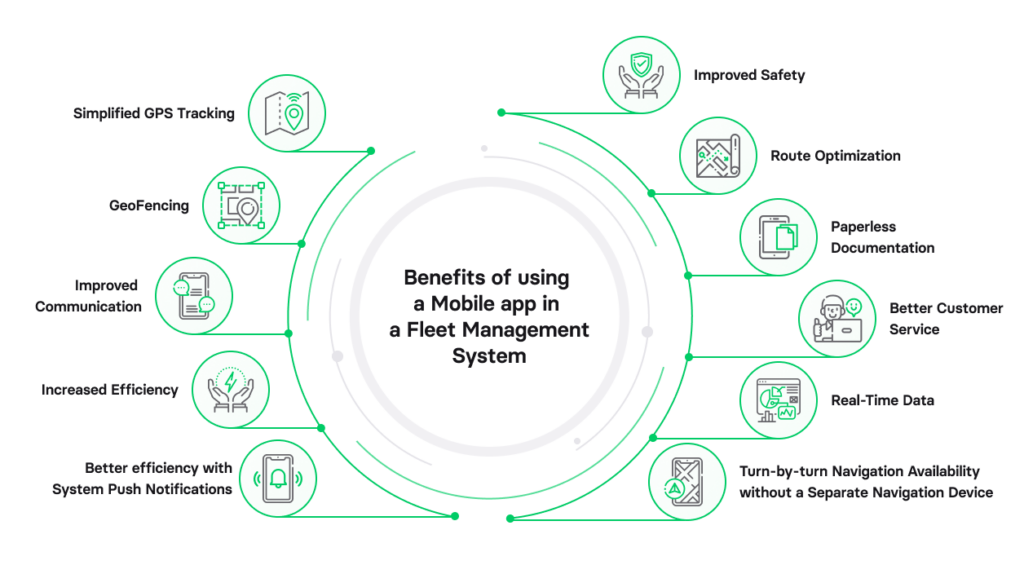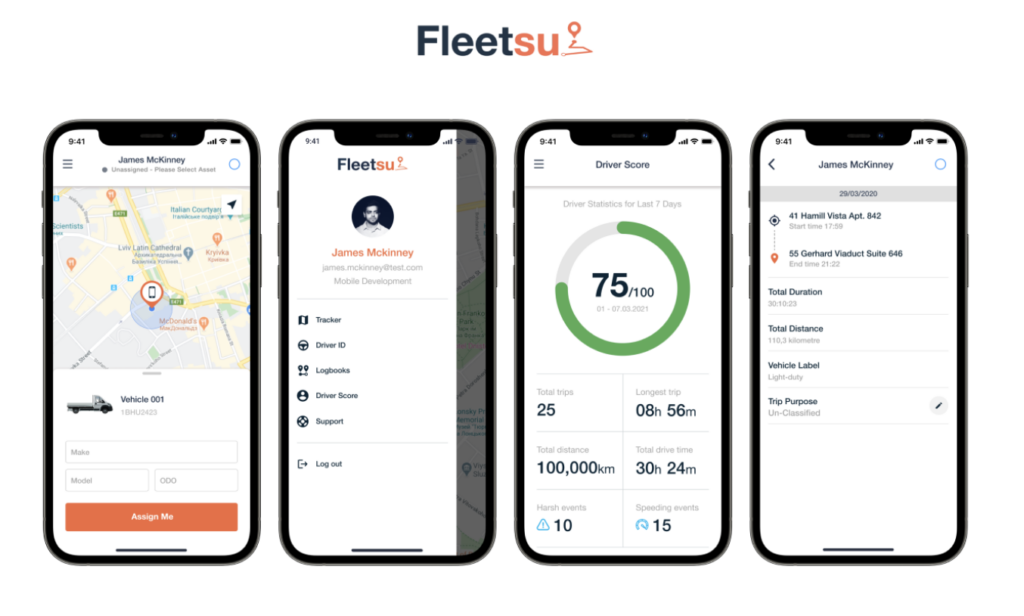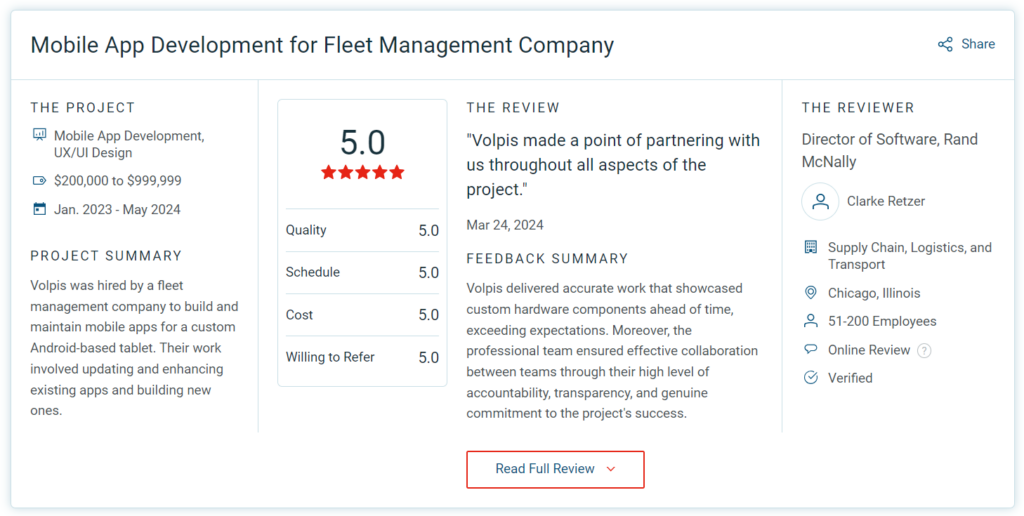From real-time data access and GPS tracking to driver performance monitoring and paperless documentation, mobile fleet tracking technology has revolutionized how companies oversee and optimize their vehicle fleets. Incorporating mobile apps into fleet management systems can reduce error-prone processes and benefit your business in the long run.
Over the past 8 years, the Volpis team has perfected their craft by creating custom fleet management apps tailored to the specific needs of various companies. In this article, we want to explore the transformative role of mobile apps in the domain of fleet management.
And if you’re considering building a custom fleet management app for your business, we would be happy to answer all your questions and give honest advice. You can always reach out to us via info@volpis.com
How mobile apps help in fleet management: 11 ways mobile fleet tracking drives success

By replacing traditional methods of fleet tracking with mobile devices, businesses can significantly reduce errors and improve the accuracy of real-time data monitoring. Mobile devices enable efficient data integration and operational automation, eliminating the need for stand-alone systems in fleet management. Here are some benefits of using a mobile app in a fleet management system:
1) Simplified GPS tracking
Fleet management apps provide real-time vehicle tracking, allowing businesses to monitor their fleet’s movements and optimize routes for operational efficiency. With app-based tracking, drivers only need to download a fleet management app to their phones and turn on their location.
This shift towards app-based tracking means the cumbersome and costly separate tracking devices are no longer necessary. It not only reduces hardware expenses but also streamlines the tracking process, making it more manageable and less intrusive for drivers.
2) GeoFencing
Enabled by mobile app-based GPS tracking, geofencing allows you to establish virtual boundaries or ‘fences’ around specific geographical locations. When a vehicle enters or exits these predefined zones, the system can trigger alerts, providing real-time updates about the vehicle’s movements.
Geofencing in fleet management helps to monitor delivery routes, ensures vehicles don’t deviate from their intended path, and keeps track of arrival and departure times. Geofencing can also contribute to improving security measures, as it can help identify any unauthorized movement of vehicles.
3) Real-time data
With a mobile app, fleet managers can access real-time data about their vehicles, drivers, and schedules. This enables them to make quick decisions and respond to issues as they arise.
For instance, managers can monitor fuel levels and vehicle health parameters, identifying potential issues before they escalate. A breakdown in transit could delay delivery schedules and incur added costs; real-time data helps avoid such scenarios, enabling prompt decisions and swift problem resolution.
4) Improved communication
Mobile fleet tracking apps foster seamless interaction between fleet managers, drivers, and customers. Drivers can use the fleet tracking app to receive instructions and updates, while fleet managers can use it to send messages and alerts. With the use of mobile technology, fleet managers can monitor vehicle locations in real-time and communicate with drivers without relying solely on phone calls.
For example, drivers can use a fleet tracking app installed on their mobile devices to receive real-time updates and instructions, ensuring they are always on the right track. Conversely, managers can send out important notifications and alerts, like changes in delivery schedules or routes, ensuring everyone is on the same page. In some cases, customers may also be kept informed about their delivery status, leading to improved customer satisfaction.
5) Increased efficiency
The mobile fleet management software can serve as a one-stop platform for tracking maintenance schedules, thereby preventing sudden vehicle breakdowns. Additionally, it can help manage your fleet and fuel consumption by analyzing driving patterns and suggesting fuel-efficient routes.
For instance, an app could suggest alternative routes during peak traffic hours to save on fuel and time, ultimately optimizing delivery schedules and minimizing operational costs.
6) Improved safety
Mobile fleet management software plays a pivotal role in enhancing driver safety. By leveraging mobile devices for safety monitoring, fleet managers can ensure the safety of their fleet by tracking vehicle locations and implementing efficient routes. Fleet management apps can provide real-time feedback on driving behavior, including data on speed, acceleration, and braking patterns.
For example, if a driver consistently exhibits harsh braking behavior, the fleet manager can provide constructive feedback and training to improve this habit, thereby reducing the risk of accidents and enhancing overall fleet safety.
7) Turn-by-turn navigation availability without a separate navigation device
Another significant advantage of fleet tracking apps is the availability of turn-by-turn navigation within the app itself. This eliminates the need for a separate navigation device, reducing clutter in the vehicle and offering a more convenient solution for the driver.
For instance, if a driver is delivering to an unfamiliar area, the in-app navigation can guide them through the most efficient route, avoiding possible confusion or detours. This contributes to faster deliveries and higher productivity.
8) Route optimization
Mobile fleet tracking apps can offer a route optimization feature that’s important for efficient fleet operations. They can analyze traffic and road closures to suggest efficient routes, saving time and fuel. This leads to more profits and a smaller carbon footprint.
Using a centralized system through mobile devices, fleet management software helps businesses save time in the delivery process by suggesting the most efficient routes based on real-time traffic conditions.
9) Paperless documentation
Fleet management software can offer a convenient and efficient alternative to paper documentation. Digital forms and electronic signatures eliminate the need for paper-based processes, reducing the risk of errors and delays.
The fleet management app can store important documents like driver’s licenses and insurance certificates, allowing quick access to this information when needed. Reports can also be generated and saved through mobile apps.
10) Better customer service
Mobile apps in fleet management systems offer a convenient solution for accessing roadside assistance, minimizing delays, and addressing issues promptly. With a mobile app, your business can provide better customer service by providing real-time updates on vehicle location and estimated arrival times.
For example, in case of a delay due to unforeseen circumstances, the customer can be immediately notified with a new estimated arrival time, thereby managing their expectations and maintaining service standards.
11) System push notifications
Push notifications can keep drivers informed about crucial vehicle and route information. For instance, if the vehicle’s sensors detect low tire pressure, unusual vibrations in the engine or gearbox, or entry into a restricted area (geofencing), push notifications alert the driver immediately, allowing for prompt action.
Similarly, route and navigation updates can be sent directly to the driver, ensuring they are always on the most efficient path. This real-time communication not only enhances safety but also optimizes vehicle performance and route efficiency.
Most popular features of mobile fleet management apps
With a wide range of powerful features, a mobile app can become a powerful tool to help you enhance efficiency, improve safety, and streamline operations.

With a fleet tracking app, you’ll be able to track the location of your vehicles in real-time on a map, giving you the power to monitor their movements and optimize routes for improved operations.

By setting up virtual boundaries using the app, you’ll receive instant notifications when your vehicles enter or exit specific areas, providing enhanced monitoring capabilities and ensuring better security.

You’ll stay on top of your vehicle’s health with alerts and notifications for diagnostics such as low fuel, maintenance reminders, engine issues, or tire pressure warnings, enabling you to address potential problems promptly and ensure your fleet operates smoothly.

By capturing and analyzing metrics like speeding, harsh braking, and rapid acceleration through the app, you can promote safer driving practices, reduce fuel consumption, increase productivity, and improve efficiency.

Efficiently assign tasks and routes to your drivers, empowering them with real-time updates and optimized routing through the app. This ensures timely deliveries, minimizes fuel costs, and streamlines your fleet operations for maximum productivity and customer satisfaction. You can track orders and manage your fleet with increased accuracy, allowing you to respond quickly to changes in the delivery process, which is an essential part of fleet management for businesses with many drivers.

Take control of your fuel consumption by tracking usage, monitoring fuel levels, and identifying potential fuel theft or inefficiencies using the app’s fuel management feature, helping you reduce costs and promote fuel economy.

Never miss a vehicle maintenance task again. Schedule and manage maintenance through the app, track service history, and receive reminders for routine tasks, preventing breakdowns and prolonging the lifespan of your vehicles.

You can gain valuable insights into driver performance with reports and analytics provided by the app, including metrics such as mileage, idle time, and on-time deliveries. This feature allows you to identify areas for improvement and recognize your top-performing drivers.

Empower your drivers to report accidents, incidents, or vehicle issues directly through the app, streamlining the reporting process and ensuring the timely resolution of any incidents that occur on the road.

Seamlessly integrate with ELD systems through the app, automating and managing drivers’ hours of service (HOS) records to ensure compliance with regulations and simplify the logging process.
A robust mobile app can offer a plethora of features that cater to the nuanced needs of fleet management. To get a comprehensive overview of these potential features, you can check out this comprehensive guide on fleet management software engineering.
Our experience: a case study on building custom mobile location tracking app Fleetsu
At Volpis, we had the privilege of developing many custom mobile apps globally. We invite you to explore our portfolio for a detailed look at the mobile apps we have developed for our valuable clients.
One example is FleetSu, a mobile app that provides real-time vehicle tracking, insightful analytics, and efficient communication tools.

Challenge: The main requirement was to achieve frequent and precise location tracking in the background, ensuring the capture of high-quality data for further analysis. We had to deliver a solution that matched the accuracy of the hardware previously used for tracking and data collection.
Development process: Throughout the development process, we focused on close collaboration with the Fleetsu team, understanding their unique requirements and iterating on the solution to optimize its performance. To meet Fleetsu’s expectations, we embarked on a native mobile development approach, leveraging supportive functions such as device activity tracking, significant-change location service, and constant iterative testing.
Results: The app’s precise location-tracking capabilities matched and even exceeded the accuracy of the previously used hardware, ensuring the capture of high-quality data for analysis. This allowed fleet managers to monitor vehicle movements, identify potential inefficiencies, and take proactive measures to enhance efficiency and reduce costs.
Our team, consisting of over 35 in-house experts, brings extensive experience and creativity to each project. The Fleetsu mobile app stands as a testament to our commitment to delivering innovative solutions that meet the unique demands of our clients in the fleet management industry.
How Volpis can bring your mobile app vision to life
Regularly ranked among the Top Custom Software Development Companies on Clutch, Volpis has been leveraging the power of technology to help business owners achieve unparalleled efficiency. Our commitment to excellence is reflected in the glowing reviews from our customers, who consistently praise our dedication to delivering exceptional results.

Read more reviews from our valuable customers here
We’d love to answer any questions you may have. You can reach out to us via info@volpis.com with any questions or to explore how we can be part of your journey.
Questions & Answers
FAQ
How do mobile apps enhance efficiency in fleet management?
Mobile apps significantly enhance fleet management efficiency by automating numerous manual processes like scheduling, dispatching, and tracking. They provide real-time visibility into the fleet’s activities, which aids in identifying inefficiencies and optimizing routes for fuel and time savings. Additionally, they offer insights for predictive maintenance, thus reducing vehicle downtime and enhancing overall operational efficiency.
Can mobile apps help streamline operations in fleet management? If so, how?
Indeed, mobile apps are instrumental in streamlining fleet management operations. They offer centralized platforms where managers can easily monitor and manage everything from vehicle maintenance schedules, driver behavior, and fuel consumption, to routing and dispatching tasks. By automating these tasks, these apps reduce administrative overheads, minimize errors, and free up time for other strategic tasks, leading to streamlined operations.
How do mobile apps provide real-time data for better decision-making?
Mobile apps in fleet management provide real-time data by leveraging GPS tracking and telematics. This allows managers to monitor vehicle location, fuel usage, driver behavior, and more in real-time. With this wealth of data, managers can make informed, timely decisions to optimize routes, schedule preventive maintenance, and reduce fuel costs, leading to significant operational improvements.
How do mobile apps contribute to improved customer service?
Mobile apps contribute to improved customer service by enhancing transparency and communication. Customers can get real-time updates about their shipments, including estimated arrival times and current location, leading to increased trust and satisfaction. Furthermore, these apps can facilitate quicker response times to customer queries and complaints by streamlining communication channels between drivers, dispatchers, and customer service representatives.
What is fleet app?
A fleet app enables your business to access real-time data and make quick decisions based on it. It helps to monitor the location of your vehicles, check driver performance, and track maintenance schedules. Mobile devices enable efficient data integration and operational automation, eliminating the need for stand-alone systems in fleet management.
What is the meaning of mobile fleet management?
Mobile fleet management refers to the use of software and mobile apps to oversee and coordinate the vehicles within a company’s fleet. This technology enables real-time tracking, route optimization, and efficient communication between fleet managers and drivers.
What is fleet management in logistics?
Fleet management in logistics involves overseeing and coordinating various aspects of a company’s vehicle fleet to optimize performance and efficiency. It encompasses tasks such as vehicle maintenance, route planning, driver management, and fuel consumption tracking.
What are the key considerations for fleet management app design?
When designing a fleet management app, it’s crucial to focus on user experience, real-time data integration, and robust functionality. The app should offer an intuitive interface that allows users to easily monitor vehicle statuses, track locations, and manage schedules.
What is mobile fleet management?
Mobile fleet management refers to the use of mobile apps and technologies to oversee, organize, and coordinate fleet vehicles from smartphones or tablets. This approach provides real-time data on vehicle locations, driver behaviors, and vehicle health, facilitating instant decision-making and communication
How can I track my fleet?
To track your fleet effectively, you can use mobile fleet management software that provides real-time GPS tracking. This technology allows you to monitor the locations and movements of your vehicles from a centralized platform or mobile device. Additionally, integrating features such as geofencing, route history, and live traffic updates can help you manage your fleet more efficiently.
What is the best way to track company vehicles?
The best way to track company vehicles is by utilizing GPS fleet tracking technology. This method involves installing GPS-capable devices in vehicles, which then transmit location and movement data to a central fleet management software. This system allows for real-time monitoring, route optimization, and detailed reporting on vehicle usage.
Do companies track fleet vehicles?
Many companies implement systems to monitor, track, and manage their fleet vehicles to enhance operational efficiency, cost-effectiveness, and safety. To boost fleet safety further, numerous businesses integrate advanced fleet safety monitoring systems, which help in maintaining high safety standards and improving overall fleet performance.
What are the benefits of fleet management system?
The benefits of a fleet management system include improved operational efficiency, enhanced driver safety, and reduced operational costs. It enables real-time tracking of vehicles, optimized route planning, and maintenance scheduling, which can lead to significant fuel savings and better utilization of assets. Additionally, such systems enhance compliance with safety regulations and provide detailed analytics that help in making informed decisions to improve overall fleet performance.
What is the competitive advantage of fleet monitoring system?
Fleet monitoring systems offer significant competitive advantages by optimizing operational efficiency, reducing costs, and enhancing customer service. They enable businesses to outperform competitors through more reliable and efficient services, which can lead to increased customer satisfaction and loyalty. Additionally, these systems provide valuable data that can be used for further improvements and strategic decision-making.






